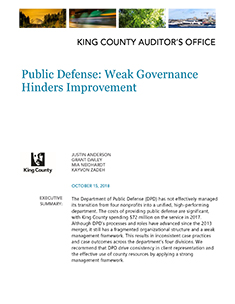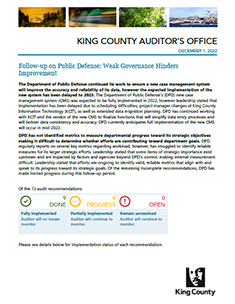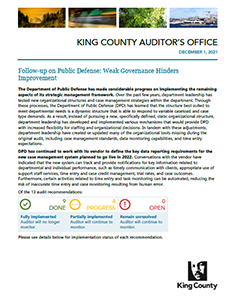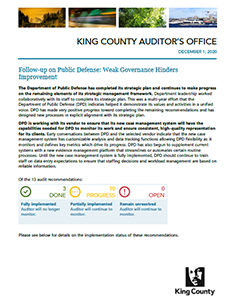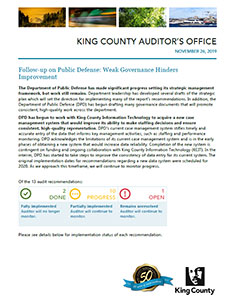Public Defense: Weak Governance Hinders Improvement
October 15, 2018
NEW! Download the latest follow-up report
The Department of Public Defense (DPD) has not effectively managed its transition from four nonprofits into a unified, high-performing department. The costs of providing public defense are significant, with King County spending $72 million on the service in 2017. Although DPD’s processes and roles have advanced since the 2013 merger, it still has a fragmented organizational structure and a weak management framework. This results in inconsistent case practices and case outcomes across the department’s four divisions. We recommend that DPD drive consistency in client representation and the effective use of county resources by applying a strong management framework.
Status
Of the 13 recommendations:
| DONE | 9 | Recommendations have been fully implemented. Auditor will no longer monitor. |
|---|---|---|
| PROGRESS | 4 | Recommendations are in progress or partially implemented. Auditor will continue to monitor. |
| OPEN | 0 | Recommendations remain unresolved. Auditor will continue to monitor. |
| CLOSED | 0 | Recommendation is no longer applicable. Auditor will no longer monitor. |
Summary
The Department of Public Defense provides legal counsel for some of King County’s most vulnerable populations. The right to legal representation is guaranteed by both the United States Constitution and the Washington State Constitution.
As a result of a 2013 lawsuit, King County incorporated four nonprofit organizations to establish the Department of Public Defense.
Implementing our recommendations will help ensure that DPD is providing representation that meets King County’s standards of consistency and quality along with good stewardship of public funds.
The Department of Public Defense (DPD) has not effectively managed its transition into a unified, high-performing department. It is missing key organizational tools like a robust strategic plan and ways to track and improve performance. This lack of direction impedes DPD’s ability to accurately predict its resource needs, ensure consistent client representation, and determine the optimal organizational structure.
King County spent $72 million on public defense in 2017. Although efforts to meet caseload standards and ensure equal pay with Prosecuting Attorney’s Office employees drove budget increases, DPD has not created reliable measures of its work. DPD’s caseload has not grown significantly since its formation, and the model that drives DPD’s staffing may perpetuate inefficiencies and inaccurately predict resource needs.
Gaps in basic management processes make it difficult for DPD to ensure consistent practices and outcomes across its four divisions. DPD does not have established procedures or standards to promote consistency across the department, meaning similarly situated clients served by different divisions may receive a different quality of service. Because information about cases is not easily accessible outside the divisions, the DPD Director’s Office is limited in its department oversight; for example, evaluating performance or making informed changes to ensure departmental success. In some cases, available data is not reliable due to data entry problems.
Despite DPD’s stated goal to keep as many cases in-house as possible, the current organizational structure results in more cases being sent to outside counsel than necessary. The current structure also creates other logistical barriers for DPD.
We recommend that DPD develop a comprehensive governance framework to drive consistency and the effective use of county resources across the department.
Reports related to this audit
Currently, there are no related reports to this project.
Audit team
Justin Anderson, Grant Dailey, Mia Neidhardt, and Kayvon Zadeh conducted this audit. If you have any questions or would like more information, please call the King County Auditor's Office at 206-477-1033 or contact us by email KCAO@kingcounty.gov.

 Translate
Translate
